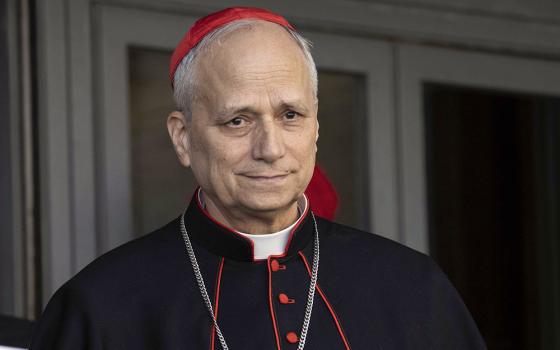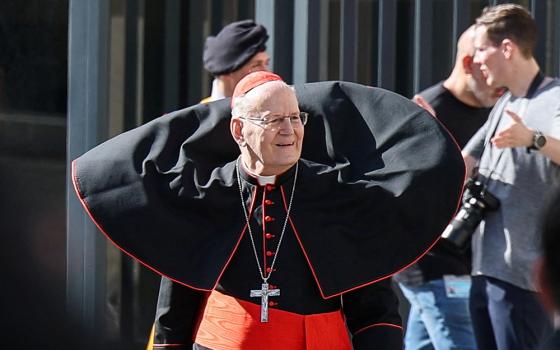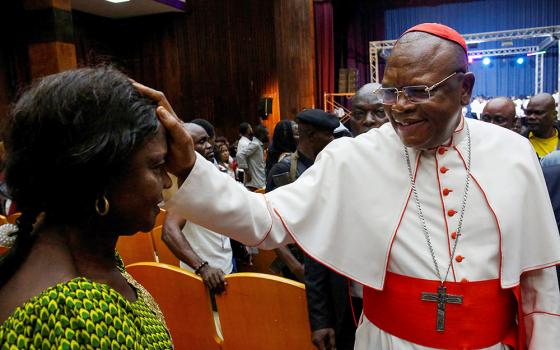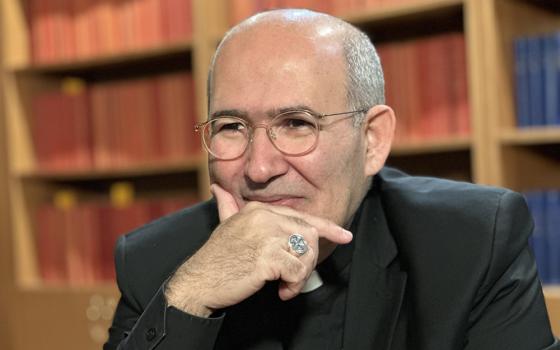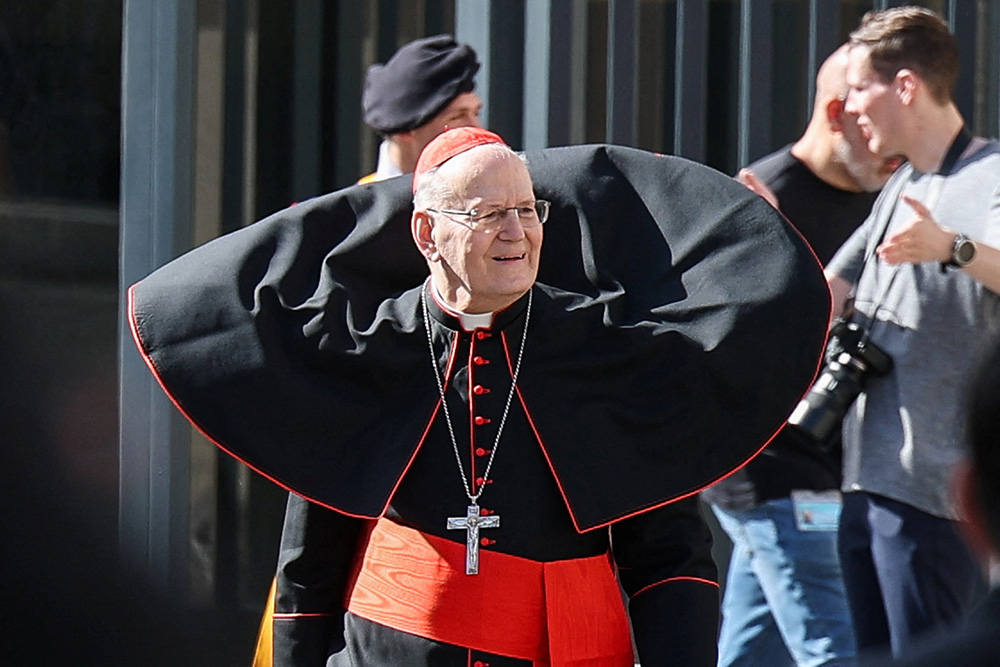
Hungarian Cardinal Peter Erdo of Esztergom-Budapest arrives at the Vatican April 22, 2025, following the death of Pope Francis. (OSV News/Reuters/Mohammed Salem)
The likely top candidate for the conservative wing of the College of Cardinals is a 71-year-old primate of Hungary known for embracing the anti-migrant views of Hungary's prime minister, Viktor Orban, in contrast to Pope Francis.
Cardinal Peter Erdo, the archbishop of Esztergom-Budapest, is a leading candidate for those looking for a pontiff who can clamp down on what they view to be Francis' haphazard approach to doctrinal questions.
Those cardinals are annoyed by what they perceive to be the freewheeling nature of the late pope's emphasis on synodality, and his unconventional methods of governing the church. They see Erdo as an antidote.
But given the sheer numbers of those Francis has appointed — eight in 10 of the 133 cardinals who will enter the Sistine Chapel — it's hard to imagine this minority bloc being able to gain enough momentum for Erdo to emerge from a conclave wearing white.
Still, as a minority block, they may try to leverage this to push for a compromise candidate who is more moderate and sympathetic to their concerns.
For this reason, it's worth taking Erdo seriously, as he's well-known in Rome and throughout the global hierarchy.
And in a conclave where much of what will matter is name recognition, it would be foolish to completely count him out, especially if there is a desire to see the papal pendulum swing in the other direction.
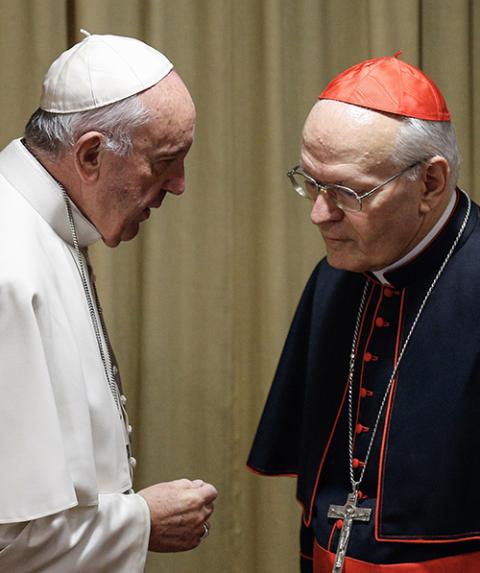
Pope Francis talks with Cardinal Peter Erdo before a session of the synod on the family at the Vatican Oct. 24, 2015. (CNS/Paul Haring)
One cardinal who had wanted Erdo to be recognized in the next conclave was Australian Cardinal George Pell. Before his death at 81 in January 2023, he made no secret that he was angling to be a kingmaker in the next conclave. Through public statements, articles and behind-the-scenes private dinners, the campaign was well underway for a candidate who would place an emphasis on, as Pell perceived it, Catholic orthodoxy.
Pell's candidate of choice was Erdo. According to the prolific and polarizing right-wing American writer Rod Dreher — who has resettled in Budapest — Pell believed Erdo was "a very fine canon lawyer and this place [Rome] is lawless."
Born in Budapest in 1952, Erdo, who has a twin brother, is the oldest of six children, and has effectively spent his entire life inside the church and its institutions.
At age 6, he began serving as an altar boy and in high school he began to seriously discern the priesthood.
After a brief stint in military service following a draft, Erdo studied in the seminary in Esztergom, just north of the Hungarian capital of Budapest. Eventually he was sent to Rome, where he received a doctorate in both theology and canon law.
Following his ordination in 1975, much of his early ecclesial life was in the classroom, teaching at the Esztergom seminary and at the Pazmany Peter Catholic University, where he would eventually serve as rector from 1998 to 2003.
In 1999, Pope John Paul II named Erdo an auxiliary bishop of the Szekesfehervar Diocese in central Hungary. Just three years later, in December 2002, Erdo was fast-tracked and made archbishop of Esztergom–Budapest.
Less than a year later, in October 2003, he received the cardinal's red hat, where for nearly seven years, until 2010, he was the youngest member of the College of Cardinals.
From 2001 to 2011, Erdo served two consecutive terms as president of the Council of Episcopal Conferences of Europe. In this role, he became widely known throughout the continent, where he was generally perceived as a capable administrator and able to forge consensus among the diverse body.
Advertisement
He was awarded an honorary doctorate from the conservative-leaning Opus Dei in 2011.
A disciplinarian and erudite scholar very much in the mold of Pope Benedict XVI, Erdo was briefly considered to be a potential successor to Benedict following his resignation in 2013.
Throughout the Francis pontificate, Erdo has been a loyal company man, twice playing host to Francis when he visited Budapest in 2021 to close out the Eucharistic Congress and again in 2023.
While Erdo has never joined forces with the public opposition to Francis himself, he has also never shied away from voicing different approaches on some of Francis' top pastoral concerns, albeit discreetly.
During the 2014 and 2015 synods on the family, Erdo served as relator general and was tasked with drafting the final text of the gathering. In the end, Francis' final word on the synod provided a cautious opening to Communion for divorced and remarried Catholics, going further than Erdo would have liked, since he had already voiced his opposition to the idea at the beginning of the synod.
In 2015, waves of new arrivals of refugees to Europe led Francis to call on Catholic parishes and dioceses to do all they could to help them.
Erdo refused the pope's plea, saying it amounted to human trafficking. At the time, it was seen as Erdo siding with Hungary's Orban over the pope.
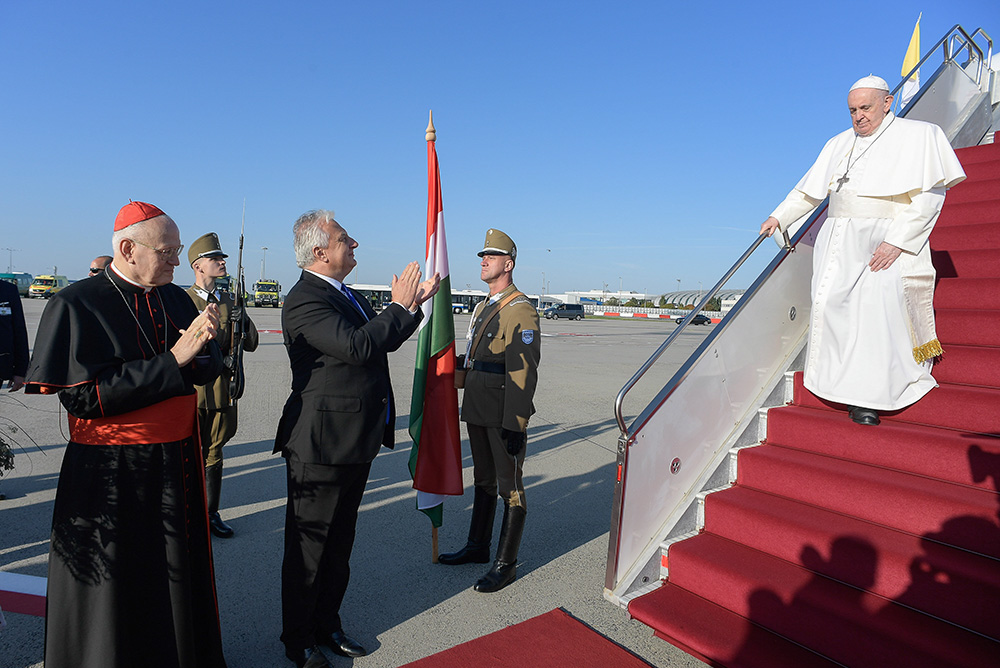
Pope Francis is greeted by Zsolt Semjen, deputy prime minister of Hungary, and Cardinal Peter Erdo of Esztergom-Budapest as he arrives at the international airport in Budapest, Hungary, Sept. 12, 2021. (CNS/Vatican Media)
Orban, who has held a tight grip on power in the country for two decades, has pumped millions of dollars into Hungary's Catholic Church and its institutions. Orban, a Calvinist, has positioned himself as a strong defender of traditional Christian values.
While Erdo has walked a fine line in order not to be seen as co-opted by the state, his warmth toward Orban's views has proven to be mutually beneficial. The ultranationalist Orban is said to love the idea of a hometown hero being named pope.
After Russia's 2022 invasion of Ukraine, Erdo changed course and welcomed thousands of new arrivals. The local church provided the overwhelming amount of aid granted to refugees from neighboring Ukraine.
Erdo has long had positive relations with the Orthodox churches and, in particular, with Russia. Whether this might be seen as an asset or liability by the College of Cardinals remains an open question.
In addition to his native Hungarian, Erdo also speaks Italian, French and serviceable English, having studied for a brief stint at the University of California Berkeley.
For more than a decade, Erdo has helped raise funds for Africa and, during the 2021 Eucharistic Congress, he was widely praised as a gracious host to the more than two dozen cardinals and bishops who attended. All of that contributed to the overall goodwill toward him among much of the hierarchy, despite his reserved manner.
For more than a decade, the world has become used to having a pope known for his charisma, which in many cases has been viewed to be an obvious boon to the Catholic Church's public relations efforts.
But if the cardinals prefer a strong course correction over the charm offensive, then they could easily look to Eastern Europe and line up behind Erdo, sending an immediate signal that a new era has begun.
This is part of a series on the leading candidates in the 2025 papal election. The National Catholic Reporter's Rome Bureau is made possible in part by the generosity of Joan and Bob McGrath.






